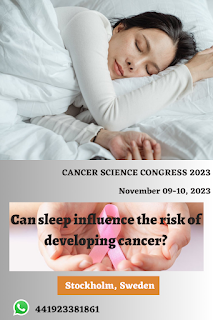Can sleep influence the risk of developing cancer?
The risk of several malignancies may increase with repeated sleep interruptions. There are other ways in which sleep and cancer are connected, though. While receiving cancer treatment, it can be challenging to get a good night's sleep, and for survivors it can be a lifelong struggle.
Researchers frequently
compare people's sleep duration (i.e., length of sleep) with whether they later
experience cancer or not to better understand the connections between sleep and
cancer risk.
Numerous studies
indicate that getting too little sleep raises the risk of getting cancer, while
others link getting enough sleep to a lower risk of developing certain cancers.
Other research finds no conclusive correlation between the amount of sleep we get
and our risk of cancer.
Recently, researchers
looked at data from around 24,000 participants in a health research study. The
average amount of sleep each person had at the beginning of the trial was
linked to whether or not they later developed cancer and other disorders by
examining data gathered from individuals over the course of roughly eight
years. Results showed that short sleep (less than 6 hours per day) was linked
to a 40% higher risk of all cancers when compared to average sleep (7-8 hours).
Studies have linked the
length of sleep to links with particular cancer types, including breast and
colorectal cancer. The term "association" refers to the fact that
those who had a particular cancer slept for less hours each night than those who
had not.
It doesn't always
follow that the little sleep was to blame for the cancer. It may play a role in
the emergence of cancer, however it most likely represents just a small portion
of a larger picture.
Uncertain factors, such
as differences in culture, way of life, genetics, or a combination of all
three, may be to blame for some populations' higher risk.
For your general health
and wellbeing, it's a good idea to try to address this if you feel that your
sleep isn't ideal or that you're having a sleep issue. Take our quick sleep
assessment to learn how we can help you sleep better as a great first step.
The
biology of sleep and cancer:
It's crucial to
recognise that there are several types of cancer when we talk about the
disease. Actually, there are more than 200 distinct types of cancer, according
to Cancer Research UK.
Numerous different
types of malignancies that each have their own unique effects on the human body
fall under the general term "cancer." The commonality across all
cancers is that they all result in the unchecked proliferation of cells within
the body. As a result, given that the term "cancer" is used to
describe a broad range of diseases, the connection between sleep and cancers is
likewise likely to be complex.
Research primarily
focuses on three areas when examining the molecular connections between sleep
and cancer, regardless of the type of cancer studied:
- Melatonin
secretion.
- Disruption of circadian rhythms
- Immune
function
We frequently follow
routines that conflict with our circadian rhythms in our fast-paced, modern
environment. In industrialised nations, 75% of the working population works
atypical hours, which are those that fall outside of the standard 8am–5pm
workday.7
So many of us stay up
late, work shifts that aren't regular, and get up when we should be sleeping.
We may unintentionally be affecting our risk of cancer by operating against our
circadian rhythms.
However, minimising
interference with our regular bodily rhythms is something we should all strive
to do, especially if you work shifts or have unpredictable schedules.
The regular use of
mammograms, prostate exams, and ensuring that you complete the prescribed
colorectal cancer screening can all aid in the early detection of malignancies.
A earlier diagnosis can increase the likelihood that a cancer treatment will be
successful, and this advise is not just for those who work shifts.
Sleep
disturbance is one of the most commonly reported complaints in people with
cancer:
Numerous studies have
shown that sleep issues are a common problem for cancer patients. While some
people's sleep disturbances may have existed before their cancer diagnosis, others may
have developed them as a result of receiving their cancer diagnosis or as a
symptom of the disease.
Sleep issues are common
for cancer patients during and after treatment. It is so evident that sleep
quality might be affected at any point during a cancer patient's journey. We'll
examine each step and potential sleep-related factors.
Symptoms
of cancer can disrupt sleep:
For some people, sleep
issues may start even before they've been given a cancer diagnosis, but they
may also be a side effect of their malignancy. Numerous signs and symptoms that
can disrupt your ability to sleep at night include:
- fever
- itching
- breathing difficulties
- bladder issues
- excessive daytime tiredness leading to
naps
- digestive issues: nausea, vomiting,
diarrhoea or constipation pain
- non-specific feelings of discomfort from
the tumour.
Additionally, without
being able to identify a specific cause, the growth of a tumour itself can
alter the body in ways that affect sleep patterns.
So you can see, even
before a person is aware of their cancer, the stage is frequently set for
developing sleep issues.
Diagnosis:
A cancer diagnosis is
upsetting and can change your life. It should come as no surprise that
receiving this news will alter your mood and possibly interfere with your
sleep. As a result of their diagnosis, many cancer patients will experience
stress, anxiety, or depression.
We are aware of the
significant connection between sleep and mental health and the benefits of
getting enough sleep for your mental health. Therefore, optimising your sleep
may help to lessen feelings of depression, anxiety,
or stress if you're experiencing any of these.
Cancer
treatments can affect sleep:
Everybody's body will
react differently to cancer because no two cases of the disease are same. This
is the main reason there isn't a single "cure" for cancer. Since
every cancer is different, every patient will experience treatment differently.
As a result, cancer
therapies differ based on the type of cancer as well as the patient. But one
thing that all cancer treatments have in common is the possibility of making
you sleepless.
Generally, cancer
treatment will involve one or more of the following approaches:
- Surgery
- Immunotherapy
- Radiation therapy
- Chemotherapy
- Hormone therapy.
After many of these
treatments, it's typical to need some time to rest and recover, which may
involve taking naps, staying in bed later, or sleeping longer. While it goes
without saying that these steps are essential for the healing process, it's
important to remember that once you feel better, you should try to return to a
regular sleeping schedule.



Comments
Post a Comment